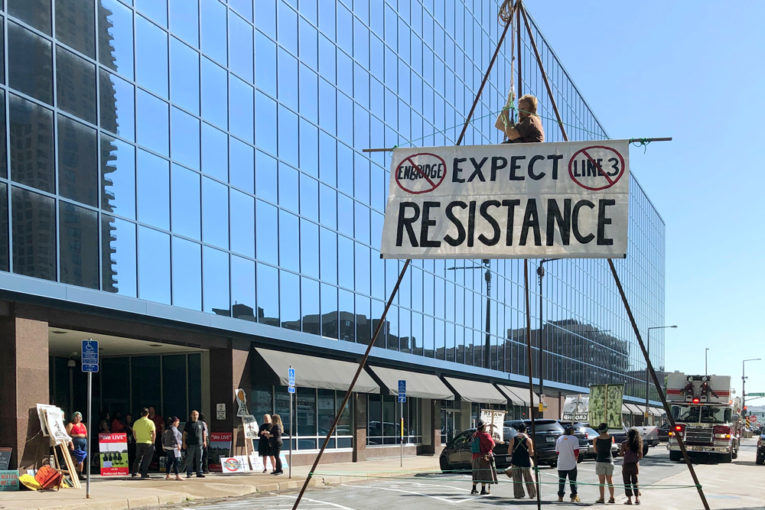
ST. PAUL, Minn. — Minnesota regulators appeared ready Thursday to approve Enbridge Inc.’s proposal to replace its aging Line 3 oil pipeline across the northern part of the state, even though a major, controversial question remains unresolved: the line’s route.
As the Public Utilities Commission began open deliberations, all five members spoke in support of the project, but some with heavy trepidation. Several commissioners cited the deteriorating condition of the existing line, which was built in the 1960s, as a major factor.
“It’s irrefutable that that pipeline is an accident waiting to happen,” Commissioner Dan Lipschultz said. “It feels like a gun to our head … All I can say is the gun is real and it’s loaded.”
“I think it’s clear where we’re all going,” Commissioner John Tuma said. “It’s just a matter of working out the details.”
Some pipeline opponents reacted angrily as commissioners prepared to break ahead of an expected vote later Thursday. An Indigenous woman stood and shouted, “You have just declared war on the Ojibwe!” Brent Murcia, of the group Youth Climate Intervenors, added: “We will not let this stand.”
Tribal and climate change activists have teamed up to fight the project, arguing in part that the pipeline risks spills in pristine areas in northern Minnesota where Indigenous people harvest wild rice. Ojibwe Indians, or Anishinaabe, consider wild rice sacred and central to their culture.
Several commissioners said the issue poses a difficult decision. Chairwoman Nancy Lange choked up and took off her glasses to wipe her eyes as she described her reasoning. Another commissioner, Katie Sieben, said it was “so tough because there is no good outcome.”
Commissioners did not discuss the route during the morning’s deliberations. The current pipeline crosses two Indigenous reservations whose tribes strongly oppose the project.
Enbridge has proposed a route that bypasses those reservations, but the tribes and climate change activists oppose that route, too. The company says it needs to replace the pipeline because it’s increasingly subject to corrosion and cracking.
The pipeline currently runs from Alberta, across North Dakota and Minnesota to Enbridge’s terminal in Superior, Wisconsin. Enbridge has said it would continue to run Line 3 if Minnesota regulators rejected its proposal, despite its accelerating maintenance needs.
Much of the discussion at the Line 3 hearings over the past several days has focused on whether Minnesota and Midwest refineries need the extra oil. Enbridge currently runs Line 3 at about half its original capacity of 760,000 barrels per day for safety reasons, and currently uses it only to carry light crude.
The project’s opponents, including the Minnesota Department of Commerce, argue that the refineries don’t need it because demand for oil and petroleum products will fall in the coming years as people switch to electric cars and renewable energy sources. Opposition groups also argue that much of the additional oil would eventually flow to overseas buyers.
Enbridge and its customers strongly dispute the lack of need in the region. They said Line 3’s reduced capacity is already forcing the company to severely ration space on its pipeline network, and that failure to restore its capacity would force oil shippers to rely more on trains and trucks, which are more expensive and less safe. Business and labour groups support the proposal for the jobs and economic stimulus.
The Public Utilities Commission’s decision likely won’t be the final word in a long, contentious process that has included numerous public hearings and the filings of thousands of pages of documents since 2015. Lange said earlier this year that the dispute was likely to end up in court, regardless of what the commission decides.
Opponents, including the Indigenous-based environmental group Honor the Earth, have threatened a repeat of the protests on the Standing Rock Reservation in North Dakota against the Dakota Access pipeline, in which Enbridge owns a stake. Those protests drew thousands of opponents in 2016 and 2017, with sometimes violent skirmishes with law enforcement and more than 700 arrests.
Similar concerns over the role of oilsands production in climate change, Indigenous rights and the risk of spills has fueled opposition to other pipelines out of Alberta. Opponents of TransCanada’s Keystone XL pipeline to Nebraska are still fighting that project in court. The Trudeau government agreed last month to buy Kinder Morgan’s Trans Mountain pipeline running from Alberta to the West Coast for US$4.5 billion to ensure completion of the company’s plan to nearly triple the line’s capacity.
Enbridge has already replaced the short segment of Line 3 in Wisconsin and put it into service. Construction is underway on the short segment that crosses northeastern North Dakota and on the longer section from Alberta to the U.S. border, and Enbridge plans to continue that work. Enbridge has estimated the cost of the Canadian segment at US$5.3 billion and US$2.9 billion for the U.S. segment.
You can read more of the news on source
